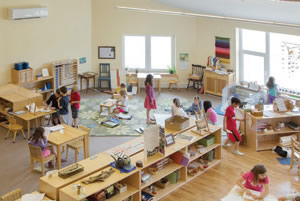Energy-Efficient Solution Helps Keep School Warm

Mitsubishi Electric helped give Hollis Montessori both energy efficiency and a great teaching tool for its students.
The Hollis Montessori School (Hollis Montessori), Hollis, N.H., is the first independent school in the country to receive Passive House certification. This certification denotes the school’s extreme energy efficiency and means the facility has met rigorous energy-saving standards. Students have been particularly interested in the equipment on the walls that keeps their classrooms comfortable and their school compliant with Passive House standards. That equipment is part of a Hyper-Heating INVERTER™ (H2i®) system from Mitsubishi Electric US, Inc. Cooling & Heating Division (Mitsubishi Electric).
Mitsubishi Electric was selected as the brand of choice because “the availability of hyper- heating was really important given the rough northeast winters. We also like the track record of performance and reliability with Mitsubishi [Electric], and their extensive service network relative to other manufacturers,” says Jordan Goldman, principal of ZeroEnergy Design (who led the Passive House consultation). Frank Grossman, president, board of directors at Hollis Montessori adds, “Mitsubishi [Electric] also wouldn’t need backup heat.”
Installation “went very smoothly,” says Grossman. Outdoor units were put on stands to maintain efficiency during New Hampshire’s snowy winters. Indoor units were mounted to the wall of each 1,400-square-foot classroom to “simplify the distribution without sacrificing any thermal comfort at all,” said Goldman.
Grossman explains that the school “also added sub-panels throughout the building where students can find out what energy their classroom is using compared to other classrooms.”
Students occasionally ask for the data, which they can see on tablets. It makes them both excited and curious. They try to figure out why one classroom is using more energy than another. The upper elementary kids also do units on energy and are educated about the heat pump system.
www.mitsubishipro.com
This article originally appeared in the issue of .